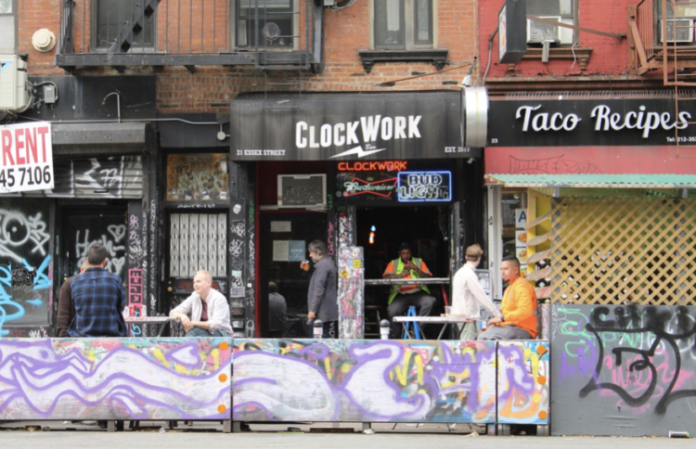Photo: Candace Pedraza
The following guest post was written by Candace Pedraza, a PhD student at the Newmark School of Journalism.
The concept of Open Streets is simple: the use of public space, which is normally not available for restaurants and communities, is allowed to ensure socially distant patronage of local businesses and a safe revitalization of neighborhood relationships.
The initiative was the city’s solution for troubled business owners reopening after Covid and for residents in need of outdoor activities amid the pandemic. However, some neighborhoods, like the Lower East Side, are reluctant to make the program permanent – especially as it may put small businesses and local residents at risk.
Complaints about noise and quality of life were at the center of the pushback to end open streets and restaurants in the district. These concerns have resulted in several proposals for liquor licensing being rejected by Community Board 3.
According to 311 Open Data, 30,652 noise complaints were filed with 311 within the confines of Community Board 3 between March 2020 and September 2021. Over 4,000 of these complaints have been about commercial businesses since Open Restaurants started, and over 10,000 of these were complaints about street noise.
Compared to the same period in the previous year in 2019, 22,742 noise complaints were filed in the region. Noise has always been a problem for residents of the Lower East Side, but some say the increase is remarkable.

Photo: Candace Pedraza
“It really feels like a concert that was just left out … it wasn’t like that before,” said Marcell Rocha, a Lower East Side resident, from the area behind Ludlow Street on Orchard Street proper.
Rocha is a member of the Orchard Street Block Association and lives on Orchard Street. He explained that while the area has always been a hotspot for bars and clubs in the city, he had never experienced the pre-Covid atmosphere as it is now.
“It turns into Hell Square Two,” said Rocha. Hell Square is often used to describe the area bounded by Allen, East Houston, Delancey, and Essex Streets and has an extremely dense area of liquor licenses.
LES Dwellers bloc founder Diem Boyd expressed that interest in businesses that attract tourists and the younger generation takes precedence over the safety and health of the area’s residents.

Locals file lawsuits against open restaurants
“Any room that isn’t dedicated to eating and drinking … you’ll see a rent increase,” Boyd said. She believes this will lead to “brutal” evictions of local residents and smaller businesses.
“This is the city that is giving away public space to private landlords … the sheds are a metaphor for the lack of accessibility now. Residents can’t afford a $ 20 cocktail to sit outside, ”Boyd said.
City Council candidate Jenny Low had loudly spoken out in favor of Open Streets and Restaurants in Chinatown; and the Sino-American Planning Council also supported this plan.
However, the action was rejected by the Ministry of Transport in autumn last year due to traffic restrictions. Jan Lee, a Chinatown resident and a member of the Chinatown CORE Block Association, provided another reason for rejecting this proposal.

“A third of the population in Chinatown is over 65 years old, another third of that group has to be picked up by Access-a-Ride … road closures would make it difficult,” said Lee.
Access-a-Ride is operated by private transport companies on behalf of the city and offers hundreds of routes through the five boroughs. They primarily look after residents with disabilities and seniors who may have difficulty accessing public transport through the MTA.
Open Streets means road closings for an entire weekend, which would block traffic through areas with a higher density of elderly and low-income residents who rely on Access-a-Ride for medical appointments and other quality of life needs.

Photo: THE residents
“Candidates will say things during their campaign … they don’t always make sense,” Lee said.
Christopher Marte, newly minted councilor for District One and a lifelong resident of the Lower East Side, said he didn’t understand Low’s suggestion and showed no consideration for small businesses that don’t serve food and drink.
“You have jewelers, you have china shops, you have small health facilities … the economic ecosystem is much more diverse and there are not just bars and restaurants,” said Marte.
Marte also said that while he was against the “car culture” in the city, a reliable source of tourism for Chinatown is commuters who drive to the area from New Jersey and Long Island.
Anna London, a younger LES resident, described her block in Alphabet City as “total chaos,” especially since school opened for NYU students in September.
“There are hyper-police on Avenue D, but not so many cops in places considered luxury. You would literally have to go to Avenue D to ask them to stop what is going on near you, ”London said.
NYPD officials have said there isn’t much they can do other than block streets to pedestrian traffic on weekends to stop the flooding of bar-goers in LES and Hell Square.
Mitchell Keller, a Bushwick resident and LES restaurant operator, said he didn’t mind the noise in the area and that it made a positive difference to the way he worked. has made Fat Choy in Broomestrasse.

Photo: New York Shitty
Meanwhile, DOT has released a schedule to make open restaurants an integral part of the city’s streetscape and to transform the public space into private property with the change of zone text and local laws. However, a program designed to open streets can cause them to be closed to those who need it, according to Boyd.
“You can no longer participate in the community. Even if they are supported, they are no longer part of the street scene… that’s immoral, ”she says.
Countermeasures are in place now as concerned residents across Manhattan have just filed a lawsuit against the city to halt the program.

